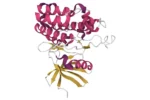Research and Functions Of MOTS-c Peptide
MOTS-c peptide has been suggested by researchers to improve brown fat function and decrease fat tissue accumulation in murine models. Furthermore, MOTS-c peptide may potentially prevent adipose tissue dysfunction and inflammation after insulin resistance. MOTS-c peptide has been hypothesized to influence fat metabolism by activating the AMPK pathway.[1] Yet, the researchers note that “MOTS-c activated AMPK pathway to improve energy dissipation and insulin sensitivity.” The AMPK pathway is a cellular pathway activated when cellular energy levels are low, inducing cells to take up glucose and fatty acids for metabolism. MOTS-c peptide has been suggested to activate the AMPK by targeting the methionine-folate cycle, potentially increasing AICAR levels.
According to research, the peptide may be able to travel from the mitochondria to the nucleus, influencing nuclear gene expression. MOTS-c may potentially modulate cellular genes involved in glucose restriction and antioxidant responses during metabolic stress.[2] MOTS-c peptide appears to be an active modulator of monoacylglycerol, sphingolipid, and dicarboxylate metabolism in research models of obesity. MOTS-c appears to reduce fat accumulation by inhibiting these pathways and increasing beta-oxidation.[3] MOTS-c research into fat deposition and insulin resistance is gaining traction, as scientists believe the peptide may offer a novel approach to addressing the pathophysiology of obesity and diabetes.
Fat oxidation is considered to be reduced by dysregulation of fat metabolism in the mitochondria. High levels of fat circulation may occur, increasing insulin levels to combat and clear lipids from the bloodstream. As a result of high insulin levels, there may be increased fat deposition and a homeostatic change. Through examinations on the impacts of the peptide, researchers suggest that these conditions may reverse.
MOTS-c peptide has also been hypothesized to function to reverse age-dependent insulin resistance in muscles, potentially improving glucose uptake. MOTS-c peptide may accomplish this by increasing glucose transporter expression and promoting the response of skeletal muscles to AMPK activation.[4] It is important to note that activating the AMPK pathway in this context may be independent of the insulin pathway, providing another method of increasing glucose uptake of muscles in the event of insulin inactivity or insufficiency.
MOTS-c may also influence Type 1 collagen synthesis, controlled by osteoblasts in the bone. MOTS-c has been suggested to act in this manner by modulating the TGF-beta/SMAD pathway, which regulates osteoblast health and survival. The potential of the peptide to modulate these pathways may promote osteoblast survival, improving type 1 collagen synthesis and bone strengthening and integrity.[6]
The peptide appears to regulate stem cell differentiation of the bone marrow and osteogenesis (new bone formation) by modulating the TGF-beta/SMAD pathway. In addition to protecting and ensuring the survival of osteoblasts, the peptide may potentially promote their development from stem cells.
Research suggests that low MOTS-c levels may be a precursor to endothelial cell dysfunction.[7] Endothelial cells line the inner walls of blood vessels, regulating blood pressure, forming plaques, and promoting blood clotting. MOTS-c does not appear to directly increase blood vessel responsiveness but may potentially indirectly impact endothelial cells, activating other responsive molecules such as acetylcholine. MOTS-c peptide has been suggested to improve blood vessel function at the microvascular, endothelial, and epicardial levels. Research further suggests that MOTS-c may play an active role in protecting heart cells against inflammation, stress, and reperfusion injury.[8]
Disclaimer: The products mentioned are not intended for human or animal consumption. Research chemicals are intended solely for laboratory experimentation and/or in-vitro testing. Bodily introduction of any sort is strictly prohibited by law. All purchases are limited to licensed researchers and/or qualified professionals. All information shared in this article is for educational purposes only.
References
- Lu H, Wei M, Zhai Y, et al. MOTS-c peptide regulates adipose homeostasis to prevent ovariectomy-induced metabolic dysfunction. J Mol Med (Berl). 2019;97(4):473-485. doi:10.1007/s00109-018-01738-w.
- Kim KH, Son JM, Benayoun BA, Lee C. The Mitochondrial-Encoded Peptide MOTS-c Translocates to the Nucleus to Regulate Nuclear Gene Expression in Response to Metabolic Stress. Cell Metab. 2018;28(3):516-524.e7. doi:10.1016/j.cmet.2018.06.008.
- Kim SJ, Miller B, Mehta HH, et al. The mitochondrial-derived peptide MOTS-c is a regulator of plasma metabolites and enhances insulin sensitivity. Physiol Rep. 2019;7(13):e14171. doi:10.14814/phy2.14171.
- Lee C, Kim KH, Cohen P. MOTS-c: A novel mitochondrial-derived peptide regulating muscle and fat metabolism. Free Radic Biol Med. 2016;100:182-187. doi:10.1016/j.freeradbiomed.2016.05.015.
- Fuku N, Pareja-Galeano H, Zempo H, et al. The mitochondrial-derived peptide MOTS-c: a player in exceptional longevity?. Aging Cell. 2015;14(6):921-923. doi:10.1111/acel.12389.
- Crescenzo R, Bianco F, Mazzoli A, Giacco A, Liverini G, Iossa S. A possible link between hepatic mitochondrial dysfunction and diet-induced insulin resistance. Eur J Nutr. 2016;55(1):1-6. doi:10.1007/s00394-015-1073-0.
- Qin Q, Delrio S, Wan J, et al. Downregulation of circulating MOTS-c levels in patients with coronary endothelial dysfunction. Int J Cardiol. 2018;254:23-27. doi:10.1016/j.ijcard.2017.12.001.
- Yang Y, Gao H, Zhou H, et al. The role of mitochondria-derived peptides in cardiovascular disease: Recent updates. Biomed Pharmacother. 2019;117:109075. doi:10.1016/j.biopha.2019.109075.






